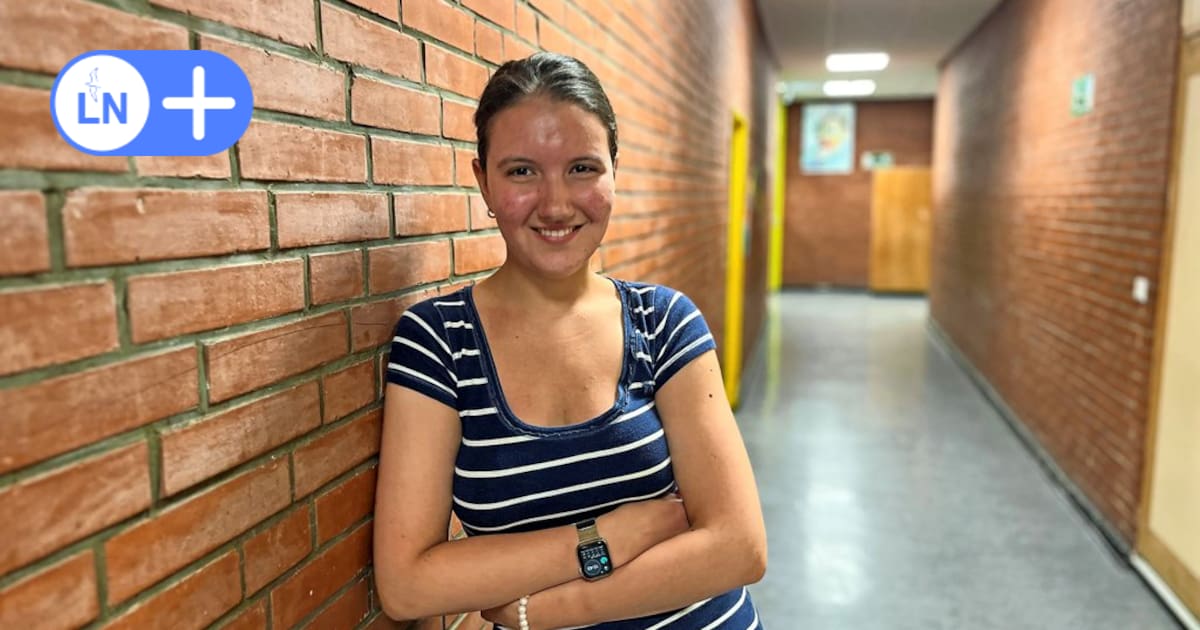
Schools in the district of Segeberg: 15-year-old calls for quiet zones
Segeberg district. Sometimes she thinks of herself as an outsider. Antonia Boda is busy, lively and direct. She juggles words like neurodiversity as if everyone knew what that meant. Neurologically diverse people are people who are somehow a little bit different mentally.
Read more after the Advertisement
Read more after the Advertisement
They have autism, attention deficit, problems with arithmetic or language, are hyperactive, bipolar, gifted or have other developmental phenomena. “I’m probably somewhere on that spectrum,” she says, laughing and quite openly, without having any evidence for it.
She is interested in journalism, but especially in psychology, if only because she has brothers with disabilities. “I myself have two disabled siblings and I know what I’m talking about. I always think of my autistic brothers when students have problems at school.”
She wants to raise more awareness of the mental health of her generation. Because the situation is dramatic, she says. Young people should go to school happier and more relaxed. Quiet zones in schools could be a solution.
Read more after the Advertisement
Read more after the Advertisement
Mental health: Segeberg’s youth talk about their own experiences
And so it was just right for her when the district council’s youth political simulation game last autumn was looking for topics to initiate social change. In the inclusion working group, she brought mental stress into play.
Young people from various schools in Segeberg then spoke about their own experiences, about how students are becoming increasingly rude to one another, how they insult and mock each other.
At the limit: Do students have too little rest and free time?
Source: Philipp von Ditfurth/dpa
“The phenomena are getting worse and worse. The age between 14 and 15 is particularly brutal,” says Antonia Boda. Young people know little about themselves and how to deal with conflicts. The Corona period has destroyed social skills and etiquette. In school lessons, the first 15 minutes are often just about rules of conduct and resolving conflicts, she reports.
The research carried out by the working group for the simulation game revealed that, according to federal data, at least one student in every high school class is affected by an attention disorder. This confirmed their own perceptions.
Read more after the Advertisement
Read more after the Advertisement
Student: Great pressure leads to aggression and withdrawal
“The problem is not illnesses like ADHD or depression,” says the student. The problem is the general high pressure and other toxic external influences, such as social media. The expectations placed on students are high. For example, her personal school day lasts from 7:45 a.m. to 5 p.m. on long days. “As a ninth-grader, I’m rarely home before 4 p.m.,” says Boda. After that, she does her homework and goes to sports.
“At my school, we have almost 1,000 students in a very small space. This everyday life means too much stress and pressure for many of them. They withdraw and want to be alone. They no longer feel like going to school. This makes them even more unhappy. It’s a totally stupid vicious circle,” she says and estimates: “Our classmates can no longer find a balance. They can no longer differentiate between school and free time.”
That’s why there should be things that relax. There is already a relaxation room at the municipal high school in Bad Segeberg. She has occasionally seen students wearing soundproof headphones. Acoustic partitions in learning rooms or soundproof work booths are also conceivable. “That should become the norm.”
The young people finally used all this information to formulate a proposal. Specifically, they demanded 6,000 euros each for all five district schools in order to establish quiet zones or other opportunities for concentration. The proposal aroused the interest of real district politicians. The FDP faction wanted the issue to be addressed.
Segeberg District Council becomes aware of the application
And so it came about that Antonia Boda recently gave a passionate speech to the education committee to justify the request. “We want the best for the students and we believe that the district should want that too,” she says.
Read more after the Advertisement
Read more after the Advertisement
Teachers are also behind the initiative. “The pandemic has caused the number of students suffering from mental health problems to rise dramatically. Providing them with the best possible support in their everyday school life is important, but challenging,” says Sylvie Arndt, head of the community school at the Leibniz Private School in Kaltenkirchen.
Help available here
There are numerous offers in the Segeberg district. Anyone looking for help can contact the Youth Welfare Office on 045 51/9 51 96 00, the crisis service of the social psychiatric service for young adults on 045 51/9 51 97 77, the Frauenzimmer association on 045 51/38 18, the Child Protection Association on 045 51/8 88 88, the ATS addiction advice center on 045 51/8 43 58 or the information center for self-help groups on 045 51/30 05. Many offers are listed on the website www.beratung-im-kreis-segeberg.de.
She notices a significant difference in her daily work when students work in peace outside the classroom or use headphones. “Noise-cancelling headphones have so far only been used in my class by one student diagnosed with autism. For her, this means a noticeable relief. If more students were provided with such headphones when they needed them, this could reduce stress.”
The heads of the two vocational training centers in the Segeberg district also praised the ideas and want to incorporate them into their school concept.
Quiet zones: Schools react to the initiative
Mental health will soon be a key topic at the Youth Academy of the Association for Youth and Cultural Work (VJKA). “The results of youth surveys and studies are clear,” says director Ali Evdedurmaz. “We want to work on making this no longer a taboo.”
Read more after the Advertisement
Read more after the Advertisement
Antonia’s speech was met with open arms in the Education Committee. “This is a really great proposal, which she has campaigned for eloquently and with commitment,” said committee chairman Alexander Wagner (SPD). All the politicians had discussed it for a long time. They no longer had to vote because money was already available in the budget for the issue. But they still didn’t want to brush the problem aside.
also read
An inter-party motion is now being worked on to explore the topic in more detail. The aim is to raise awareness among other schools. The district administration has already indicated that it will address the proposal for quiet zones more frequently and inform school authorities.
“It is great what Antonia’s words have achieved. It shows young people that involvement in politics leads to success,” says Conny Schneider, deputy leader of the FDP parliamentary group.
Read more after the Advertisement
Read more after the Advertisement
What else urgently needs to change to improve the situation, says Antonia Boda, has nothing to do with schools. “I have the feeling that parents should spend more time with their children, reflect on their actions and emotions. This is the only way to break the vicious circle and strengthen togetherness. Parents should get a lot of psychological training. You can google a lot of things these days.”
LN

Ethel Purdy – Medical Blogger & Pharmacist
Bridging the world of wellness and science, Ethel Purdy is a professional voice in healthcare with a passion for sharing knowledge. At 36, she stands at the confluence of medical expertise and the written word, holding a pharmacy degree acquired under the rigorous education systems of Germany and Estonia.
Her pursuit of medicine was fueled by a desire to understand the intricacies of human health and to contribute to the community’s understanding of it. Transitioning seamlessly into the realm of blogging, Ethel has found a platform to demystify complex medical concepts for the everyday reader.
Ethel’s commitment to the world of medicine extends beyond her professional life into a personal commitment to health and wellness. Her hobbies reflect this dedication, often involving research on the latest medical advances, participating in wellness communities, and exploring the vast and varied dimensions of health.
Join Ethel as she distills her pharmaceutical knowledge into accessible wisdom, fostering an environment where science meets lifestyle and everyone is invited to learn. Whether you’re looking for insights into the latest health trends or trustworthy medical advice, Ethel’s blog is your gateway to the nexus of healthcare and daily living.



